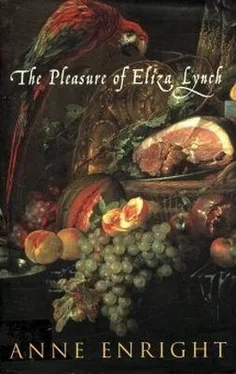Juana Pesoa was a handsome, pinched woman. She had an illness which Stewart called 'knowing your place'. She did not rage against Eliza, who was rearing her son with every advantage, nor did she pine for Lopez, who still parked his carriage outside her door from time to time. She went very still and worked on a stomach cancer. Something she could call her own.
Stewart left in a sorrowful frame of mind. He wouldn't mind a go at Juana Pesoa himself, just to cheer her up, just to knock against something that bitter. But as he made his way down the street he found himself wondering, not about the emotional little rictus that was Juana Pesoa's sexual part, but about Eliza Lynch. Were her eyes blue or were they green? he wondered. What was the exact colour of La Lincha's eyes? The colour of absinthe? Or the colour of curaçao? No matter. They were the colour of whatever was at the bottom of his glass, and he was going to look at them, right now.
Mme Cochelet said that Eliza might invite anyone she liked to her unholy christening – no one would go. Old Lopez had put his foot down. And her voice rose with satisfied indignation as Stewart, working blind under her petticoats, tightened the patent truss (after five children, Mme Cochelet suffered from a painful separation of the pubic bone).
'Good’ said Stewart. Ever since Eliza's invitations went out, he had spent his time waving smelling salts under the noses of the Lopez ladies; going from one to the other, from hysteric to phlegmatic, and each of them had a separate and very mobile pain. Finally, some respite. On the day of the baptism itself, he decided, he would get nicely soaked.
He did so on his own. The town was so silent and shuttered that Stewart felt like a ghost, roaming the streets. Everyone stayed indoors: the women sewing perhaps, the men mending their boots or reading the broadsheets, the children all subdued. And all of them thinking about the deserted rooms of La Recoleta, the impossible food spoiling on the plates, the splendid wines all untouched; a few household Indians, perhaps, gathered around the specially wrought silver font, while thousands of cut flowers wilted in the heat. They were thinking about Eliza in a dress unthinkably fine, a quiver in her cheek, a tic in her lovely whore's eye, as she looked around the empty rooms and faced, and knew, and ate, and got rightly sodomised by, her shame.
And Stewart hated the lot of them – so smug and delicious with revenge that when the guns opened fire they ran into the streets crying that the demon mistress of Francisco Lopez was coming to kill them all. Of course it was just a gun salute. It was just a reminder that old Lopez may have the country, but young Lopez had the army (as well as something else, a lover sent from Hell and a voice that came from the sky, like Tupa, the thunder god of the Guarani, rolling out over the town. Boom. Boom. Boom).
A boy pulled Stewart, by now half-cut, through the thunder to fetch up at the house of Dona Cordai. The matron opened the door herself and pushed him upstairs, where her incarcerated daughter, the madwoman Carmencita Cordai, was shouting at her dead lover. Carmencita Cordai told her dead lover that the boy who was christened that day was called Juan Francisco, as their son would have been called, if they'd had a son: that his mother called him Pancho, as she would have called her own, sweet boy. She told him that she had seen the child in the street stumbling after a hoop, and that he was very beautiful. Stewart patted his pockets for laudanum. The guns stopped.
In the shebeen where he found himself, late that night, Milton (or some Indian) said nothing. They never do. Even so, Stewart's hangover was pounded not only by the memory of the guns, but by some knowledge that he had now, but could not remember: Milton talking about a land without evil. Stewart agreeing with this place, this idea, quite loudly. They are wonderfully chiming. Milton says that Lopez is not his father's son. Undoubtedly, says Stewart, he is more European than his father, fresher, with more brio. No, says the Indian, like Jesus – like Jesus is not Joseph's son. It is possible they argued that one, for a while, but there is a kind of drunken sense to it that makes Stewart look more closely now at the squadrons of Guarani soldiers on the streets. There is a pilgrim light in their eyes. Put whatever name you like on it, they are going somewhere, and you might be obliged to come along. As for Francisco Lopez – that fat baboon – it is a sort of universal joke here: that his father is a cuckold, his mother (in her youth) a pious, trembling whore. The usual stuff – but true all the same. Because the son-and-heir is never the father's son. He could kill his father any time.
High up in the Cordillera, the scrubby hills to the east and north of Asuncion, there is a town called Piano. It was named for the fact that Eliza was obliged to abandon her piano there, a hundred miles from nowhere, and another hundred miles from anywhere at all. For all we know, the piano still survives. Perhaps a wooden panel shores up a chicken coop, or the wires are tangled into a fence and sing a little, when the wind is high. The hammers and their moss of green felt must be long decayed, but perhaps a few keys remain scattered in a broken smile, to choke the cattle or confuse the plough. Better still, the piano might grace a parlour, or what passes for a parlour in the Cordillera, with a paper taped to the front, Έ1 piano del Piano'. Perhaps it still holds the memory of the last fingers to touch it, the doctor's tender hands picking out ' La Palomita', as it stood bravely upright, surrounded by grass and by dead men, a long way from home.
But all this is unseeably distant, as Stewart stumbles around in a haze of scrofulisms and alcohol. He imagines Eliza sitting out in La Recoleta doing bad needlepoint, with the back all knots and the front full of holes. She rearranges the story of her life, 'My mother Adelaide Schnock came from a family that included forty-two magistrates and a captain of the fleet.' She orders patterns from Paris. She keeps house magnificently, and it is said that the servants love her. Servants and men – any number of them – that is all she has. You could say she has everything, except the satisfaction of having it. Also, perhaps, that she cannot relax, because she is not real. It must be hard, to be just a story the matrons of Asuncion told each other between the hours of three and four. Everything Eliza does to silence them just makes them talk the more. No, the only way she can become real is by getting married, and she cannot get married until old Lopez dies.
But nothing she did could kill him: no amount of soirées or Italian poets or diamonds or new colours for a shawl. Nothing, that is, until the theatre.
That was the trigger, thought Stewart; though the bullet was slow. He dreamed of the actor Bermejo, with a revolver. Bang! The gun springs a flag from out of its long muzzle. The old Dictator laughs. He clutches his chest. He falls endlessly towards the floor.
And where does the actor come from? The actor slithers, wet and fragrant, out from under the skirts of Eliza Lynch.
A whore needs a theatre and Eliza was a very great whore, so the building was a miniature version of Teatro alia Scala in Milan (no less), though it lacked a roof – also an orchestra, scenery, gas lamps, and women of dubious reputation in very good clothes. Eliza talked to the architect over little glasses of fino and sent to Paris upholsterers for the exact shade of red. Who else understood these things so well? It was Eliza who, before the roof slates were sourced or ordered, invited Bermejo in from Madrid.
The news that a real actor was making his way across the Atlantic flung the virgins and matrons into reverie. When he finally arrived, a little redhead with a pretty wife, the blankness of their afternoons was subtly different from the usual blankness of their afternoons. The evenings he spent with Eliza, of course, but during the day they could stroll past the veranda of the Frenchman's hotel where he sat drinking coffee, ignoring them all, and suddenly writing. The excitement of it! He wrote as though pricked all over, as though attacked by bees. Sometimes, he waved his arms to clear the buzz of thought from about his head. He feigned, he ducked, he went very still: then mysteriously the swarm would settle, and he covered page after fluid page, sheathed in a drowsy, dangerous calm.
Читать дальше












